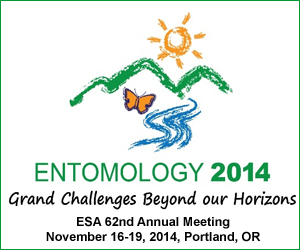An insight into the microbiome of the Spotted Wing Drosophila (Drosophila suzukii)
An insight into the microbiome of the Spotted Wing Drosophila (Drosophila suzukii)
Monday, March 3, 2014
Embassy Ballroom Prefunction (Embassy Suites Greenville Golf & Conference Center)
Microbiome associated with insects play an important role in food digestion, development, and immune responses. Recent studies support a link between insect microbiome and food digestion/detoxification. Investigations to study the role of symbionts in food digestion or detoxification have been hampered by the lack of available scientific tools. In the present study, we survey the microbial communities associated with adult developmental stage of Spotted Wing Drosophila (SWD) by pyrosequencing 16S rRNA gene amplicon. This revealed that more than 90% bacteria were from two phyla, Firmicutes and proteobacteria. Notable species detected include Rickettsiella popilliae, Geobacillus thermoparaffinivorans, Geobacillus stearothermophilus and Pseudomonas putida. This is the first report of the presence of these bacterial species and show a high bacterial diversity in SWD, with communities composed mostly by the phyla Firmicutes and Proteobacteria. Findings constitute the basis for future molecular work on the functions of SWD microbial communities and their possible role in food digestion/detoxification.


